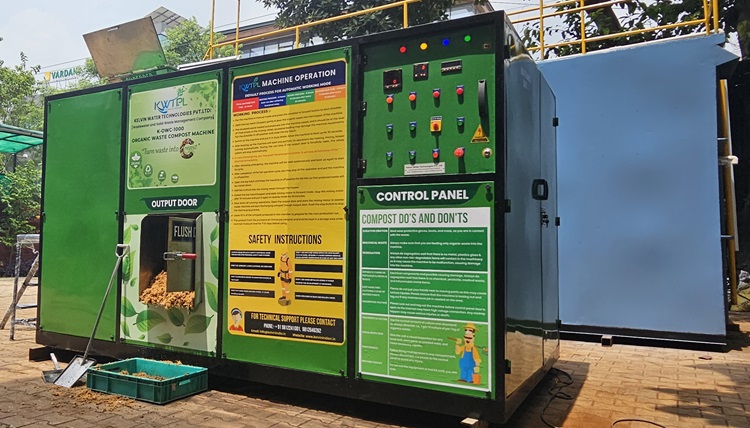Food Waste Composter

Food waste is one of the most pressing environmental and economic issues of our time. According to the Food and Agriculture Organization (FAO), nearly one-third of all food produced globally is wasted. In India alone, it is estimated that about 67 million tonnes of food is wasted every year, which is valued at around ₹92,000 crores. This immense wastage not only squanders precious resources like water and energy but also contributes significantly to greenhouse gas emissions when dumped in landfills.
To tackle this problem at its root, one highly effective solution is the use of food waste composters. These machines convert organic food waste into compost, a nutrient-rich soil amendment, thereby promoting a circular economy and reducing landfill pressure.
What is a Food Waste Composter?
A food waste composter is a device or machine designed to convert food scraps and other organic waste into compost. This process can be aerobic (with oxygen) or anaerobic (without oxygen), but the end goal is the same: transform biodegradable waste into a valuable product that enhances soil quality.
These composters are used in various settings, from households and residential communities to commercial establishments like hotels, restaurants, canteens, schools, and even municipalities. The capacity of food waste composters varies widely—from small 2 kg/day units for homes to industrial-scale machines that can handle 1000 kg/day or more.
How Does a Food Waste Composter Work?
While the exact mechanism may vary depending on the model and manufacturer, most food waste composters work using the following general steps:
1. Collection: Food waste is collected and loaded into the composter.
2. Shredding (Optional): Some machines come with shredders to reduce the size of the waste, allowing for faster decomposition.
3. Composting: The waste undergoes aerobic decomposition, usually with the help of microbial agents and heat. Some machines also add bulking agents like sawdust to enhance the process.
4. Curing (Optional): In certain models, after the initial composting, the material is transferred to a curing chamber for a few days to mature.
5. Output: The final product is dry, odourless compost that can be used for gardening, landscaping, or agriculture.
Benefits of Using a Food Waste Composter
1. Environmental Benefits
- Reduces Landfill Waste: Diverts organic waste from landfills, reducing methane emissions.
- Lowers Carbon Footprint: Reduces the transportation and handling costs associated with waste collection and disposal.
- Improves Soil Health: Compost enhances soil fertility and structure, reducing the need for chemical fertilizers.
2. Economic Advantages
- Cost Savings: Reduces waste disposal costs in the long term.
- Revenue Potential: Compost can be sold or used for on-site landscaping and farming.
- Government Incentives: Several local and national schemes support composting initiatives.
3. Social and Operational Impact
- Improves Hygiene: Proper waste management reduces pest problems and bad odors.
- Community Engagement: Promotes environmental awareness and participation.
- Compliance: Helps institutions comply with local waste management regulations.
Types of Food Waste Composter
1. Home Composters
Small and compact, these composters are ideal for households and small offices. They are easy to use and generally do not require electricity.
2. Automatic Organic Waste Converters (OWCs)
These are fully automated machines designed for medium to large-scale composting. They often come with features like shredders, heating elements, and control panels for easy operation.
3. Biogas Plants
These units use anaerobic digestion to convert organic waste into biogas and digestate (a by-product that can be used as fertilizer).
4. Community Composters
Larger than home units but smaller than industrial plants, these are used in housing societies, schools, and small commercial setups.
Features to Look for in a Food Waste Composter
- Capacity: Choose based on daily waste generation (e.g., 25 kg/day, 100 kg/day).
- Processing Time: Some machines can convert waste to compost in 24 hours.
- Automation Level: Manual, semi-automatic, or fully automatic.
- Odor Control: Important for indoor or urban installations.
- Maintenance Needs: Ease of cleaning and serviceability.
- Power Consumption: Energy-efficient models are more sustainable and cost-effective.
Buying a Food Waste Composter on GeM
The Government e-Marketplace (GeM) is a digital platform launched by the Government of India to facilitate procurement of goods and services required by various government departments, organizations, and PSUs. It ensures transparency, efficiency, and cost-effectiveness in public procurement.
Why Buy from GeM?
- Verified Sellers: GeM features verified manufacturers and service providers.
- Competitive Pricing: Transparent pricing and bulk buying options.
- Ease of Comparison: Easily compare features, prices, and reviews across multiple vendors.
- Standardized Specifications: Products listed follow defined quality and performance standards.
- End-to-End Procurement: From order placement to payment and delivery tracking.
Steps to Buy a Food Waste Composter on GeM:
1. Login/Register: Government departments or authorized personnel must register on gem.gov.in.
2. Search Product: Use keywords like “Food Waste Composter” or “Organic Waste Converter.”
3. Filter Options: Select capacity, automation level, power source, etc., using filters.
4. Compare Products: Review different products and supplier ratings.
5. Place Order or Bid: Direct purchase (for low-value orders) or bid process for higher amounts.
6. Track and Receive: Monitor the order status and confirm delivery upon receipt.
Popular Brands Available on GeM:
- Greenviron India
- EcoGreen
- Clean India Ventures
Conclusion
As India moves towards a more sustainable and eco-conscious future, managing food waste effectively becomes a top priority. A food waste composter is not just a machine—it’s a step to
ward environmental responsibility and efficient resource utilization. Whether you’re a government body, educational institution, restaurant, or housing society, investing in a food waste composter can significantly reduce your carbon footprint while creating value from waste.
The Government e-Marketplace (GeM) has made the process of acquiring such equipment easier, more reliable, and transparent. With growing awareness and policy support, composting is set to become a mainstream solution for organic waste management in the country.
| To use our services right now, you can call us at +91-9812241001 or send us an email at info@kelvinindia.in We will be delighted to assist you! |